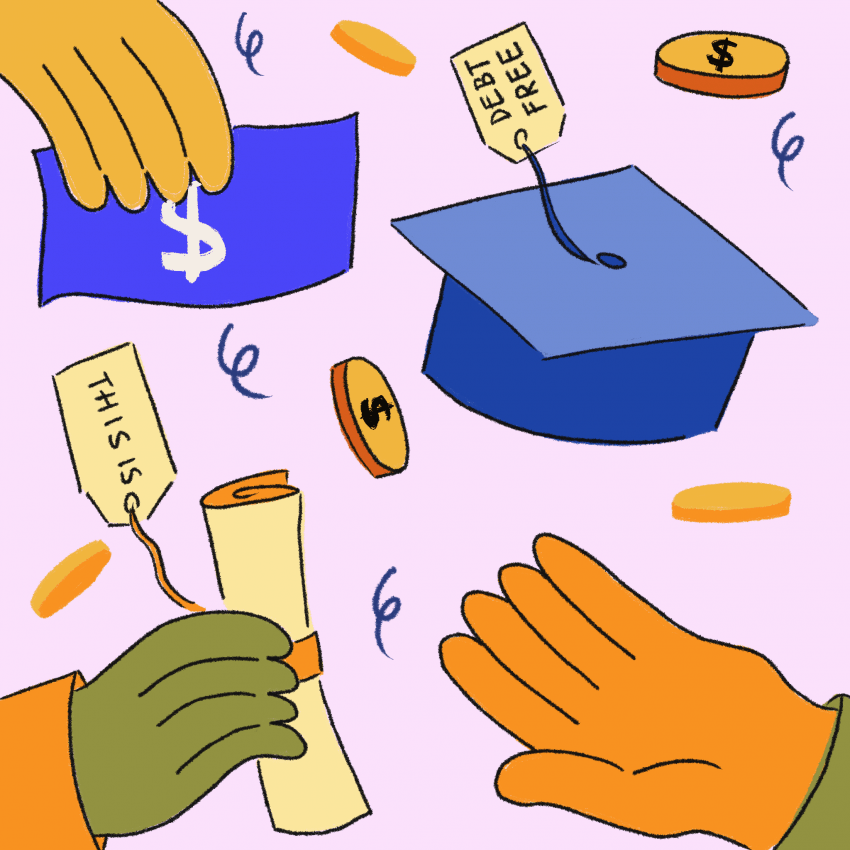
To address the growing problem of student debt, the University of Saskatchewan Students’ Union is participating in the nation-wide #DebtFreeDegree campaign, combatting one of the largest barriers to attaining quality education.
#DebtFreeDegree is led by the University Students’ Council at Western University and the Undergraduates of Canadian Research-Intensive Universities group, better known as UCRU. With ten student unions across Canada involved, the campaign aims to make “affordable, accessible, and inclusive” higher education a reality for all Canadian students, according to their website.
President Autumn LaRose-Smith says the USSU’s participation in the campaign stems from the union’s involvement with UCRU since its inception. The #DebtFreeDegree initiative in particular aligns with the USSU’s mission, vision and purpose as a student union, they say.
“To allow students an opportunity to have an education or go through university with less student debt is definitely going to enhance that student experience,” LaRose-Smith said.
#DebtFreeDegree kicked off on Nov. 3 with a week of social media campaigning to raise awareness and pique student interest. According to UCRU, Canadian students pursuing a post-secondary education currently owe $28-billion in student loans. Additionally, 45 per cent of students report owing $25,000 at the time of their graduation.
According to LaRose-Smith, the effectiveness of UCRU’s #DebtFreeDegree campaign is proven by its achievements “in terms of influencing or being able to book meetings with certain members of the federal government.”
Next week, student representatives from the USSU will be meeting with policy makers to discuss the implementation of the campaign’s goals.
The #Debt-Free Degree campaign’s two main demands are for policy makers to double the investment in Canada Student Grants and provide a two-year grace period on Canada student loans.
The first goal follows the doubling of Canada Student Grants due to the pandemic. According to LaRose-Smith, if the government is able to double their investment in student grants, the next step is to convince them to continue supporting students.
“It is often called on the students in … leadership positions to advocate to the provincial and federal government, and to the university to lower that financial stress on students,” LaRose-Smith said.
LaRose-Smith encourages students to look into and contribute to UCRU’s initiative. She says doing things like writing a postcard to a local MP, educating the community and raising awareness can make a real difference.
As a coalition involving some of Canada’s top research-intensive universities, UCRU represents nearly 250,000 undergraduate students in the country. Student unions have advocated for similar causes successfully, including the increase in Canada Student Grants in 2016 and the reduction of Canada Student Loan rates in 2019.
LaRose-Smith is optimistic for change. She mentions that just this year, the U of S was one of the only universities in Canada to implement a tuition freeze, a change that the USSU called for.
“Certainly the numbers help, so if we have more people sending these postcards or writing these emails or sharing these Instagram posts, that’s going to help us in our advocacy because then we can say, ‘look how many students support this,’” LaRose-Smith said.
For now, students can continue informing themselves and raising awareness on social media. LaRose-Smith is optimistic about the campaign and how it will help U of S students.
“Our vision [as the USSU] is to strive to be the recognized leader and enhance the student experience,” LaRose-Smith said.
—
Fiza Baloch | Staff Writer
Graphic: Anh Phan | Design Editor
Leave a Reply